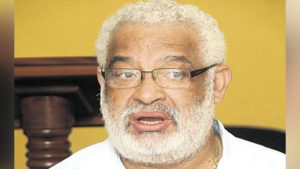 THE dreaded rectal exam which has scared off many men over the years is no longer as critical in the test for prostate problems, if orthopaedic surgeon and general practitioner, Dr Paul Wright is to be believed.
THE dreaded rectal exam which has scared off many men over the years is no longer as critical in the test for prostate problems, if orthopaedic surgeon and general practitioner, Dr Paul Wright is to be believed.
It would mean great news this Prostate Cancer Awareness Month for men who shy away from having a finger inserted in their rectum, which was the pre-eminent method used by urologists. The practice was said to be mentally associated with homosexuality.
Dr Wright said technological advancements have made it easier for general practitioners to determine if something is wrong with the prostate just by doing a blood test, as opposed to the rectal examination.
According to Wright, this blood test — prostate specific antigen test (PSA) — allows even the least experienced doctor to confirm if an ultrasound or biopsy is needed to further diagnose prostate cancer. This, he said, should help to put these fretful men at ease.
“That is my opinion because the rectal exam is based on the experience and the knowledge of the doctor doing it. If there is a urologist doing it, he would have more experience than an ordinary doctor in an office who doesn’t do them as often and knows exactly what an abnormal prostate feels like,” Wright told the Jamaica Observer.
He continued: “In the past it was diagnosed by having what we call a rectal digital examination, where the doctor would place a finger through the anus — in the rectum — and palpate the prostate gland to determine if it is enlarged [and] if it has any signs that would lead you to think something is wrong with the prostate. Then they can do biopsies and so on.”
Additionally, Wright explained that prostate cancer, like any other cancer, is the unequal growth of cells in an organ that hinders the health of the cells and causes serious damage. He also said prostate cancer may cause affected men to feel pain when urinating.
“You can also get up to pass urine and even though you want to pass urine, it takes a little time for it to flow and the stream is not as full as it used to be. You tend to drip a lot after you finish passing urine. Also, eventually you will have an inability to pass urine,” Wright stated.
Wright said there seemed to be an alarmingly high number of Jamaican men with prostate cancer, and there is anecdotal evidence of ackee being a significant culprit.
“It is abnormally high when compared to other countries, and we are not sure why. Ackee is really specific to Jamaicans, few other people would eat ackee because of the problems with hypoglycemia or what we call ackee poisoning. We eat a lot of ackee in Jamaica,” the doctor stated.
“They don’t like to do it [prostate exam] because they don’t want to know that something is wrong. The surgery to do the curative action of the treatment usually ends up with some form of erectile dysfunction, and that scares men. You tell them to do anything to the prostate and you’ll never see them again.”
Explaining that he usually enlists the wives of these men to encourage them to get an examination, Wright added jokingly: “What I usually do is to try and get the wives involved, and they would have to reassure these men that even if anything is wrong they’re not going to get a ‘gardener’ to come and stay with [them] even though they don’t have a garden.”
According to the World Health Organization, in 2020 there were 1.41 million new cases of prostate cancer worldwide.
